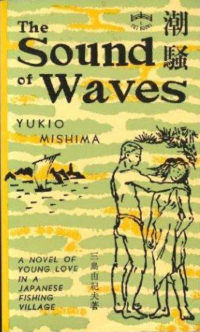From far away the world came pressing in upon him
 The Sound of Waves
The Sound of Waves
by Yukio Mishima
translated from Japanese by Meredith Weatherby
I picked this book up at the secondhand book market underneath Waterloo Bridge in London. I used to go there reasonably often and I swear it has shrunk since a decade ago. It’s really of more use if you’re looking for old maps or illustrations, but we always find something of interest.
This is a romance set on a small Japanese island where the main industry is fishing. The men go out on fishing boats while the women dive for molluscs. When one of the few rich locals brings his daughter Hatsue back to the island after she has lived on the mainland with an aunt and uncle for several years, local boy Shinji is instantly entranced. When he learns who she is he initially tries to keep his distance because he knows he will be judged as too poor and lowly to be a good match. But they keep bumping into each other and a romance quickly blossoms – one with many bumps in the road.
“The sea was the place where he earned his living, a rippling field where, instead of waving heads of rice or wheat, the white and formless harvest of waves was forever swaying above the unrelieved blueness of a sensitive and yielding soil. Even so, when the day’s fishing was almost done, the sight of a white freighter sailing against the evening clouds on the horizon filled the boy’s heart with strange emotions. From far away the world came pressing in upon him with a hugeness he had never before apprehended.”
The main problem they face is gossip that is spread about them after they shelter together from a storm. There are also rivals for both Shinji and Hatsue’s affection. Everyone finds Hatsue beautiful, but Yasuo is the president of the local Young Men’s Association and feels that he is entitled to get what he wants. He is a classic bad guy in many ways.
Chiyoko, on the other hand, the lighthouse keeper’s daughter, has been away at university in Tokyo. She is clever and sweet and has been in love with Shinji for many years. Shinji visits her parents regularly with gifts of fish, and it has always been expected that the young pair will end up together. Chiyoko could be a genuine rival to Hatsue.
“The lighthouse-keeper, who had been in this service for 30 years, was feared by the village children because of his stern look and the tremendous voice with which he stormed…but at heart he was actually a gentle person. Solitude had divested him of any feeling that men could have base motives. At a lighthouse there can be no greater treat than to have visitors.”
The setting is wonderfully evoked. You can practically smell the sea salt and feel the hot sun. And while the romance faces hurdles, like any good romance does, it doesn’t all go down in quite the way that I expected. I really was not certain how this would end.
Mishima’s life was a complicated one. A closeted gay man who loved arts and literature and detested sport, with a hyper-militaristic father who tore up his manuscripts and enforced physical fitness, plus his own weird obsession with the emperor as a divine being that led him to the extreme right wing politically, I get the impression that he never really got to live the life he wanted. But from reading this novella I think he did understand the subtleties of life and people. The women in this book are just as complex as the men, perhaps more so. And the difficulties of life are not painted as harsh but as just how it is.
Shiosai published 1954 by Shinchosha Publishing.
English translation published 1956 by Alfred A Knopf.
Source: Southbank Book Market.